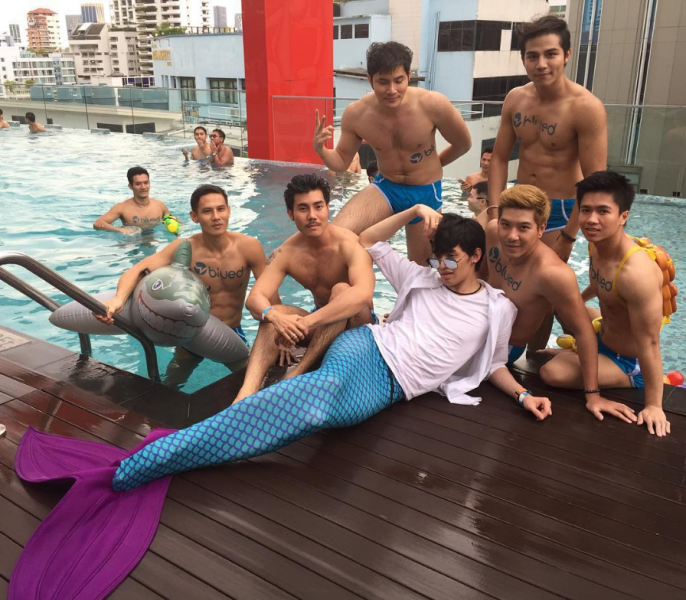With a newly minted degree in business administration and a year of Mandarin study under his belt, Wandi, 24, was ready for a challenge. And so, last September he took a job in Beijing as the Indonesia manager of a gay social media site you’ve never heard of, but it was big in China and was fast expanding elsewhere.
The app is called Blued and during Wandi’s first month with the company, its number of users in Indonesia doubled to about 300,000. But then disaster struck. One by one, over the course of nine weeks, Indonesia’s mobile phone carriers bowed to government pressure to block the gay networking app, Indonesia’s first such ban on an app like Blued. Data no longer passed from the company’s servers in China to users in Indonesia. There had been no warning or even any questioning from the ministry of communications, which issued the ban. Blued’s first inkling that something was amiss was when thousands of emails flooded into the company’s offices in Beijing asking why they could no longer access their photos.
“At first we thought it was a server problem,” says Wandi, who has asked not to have his family name published because he’s worried that details of his employers would upset his family.
“We weren’t consulted.”
In all, three gay networking apps were blocked including the equally obscure BoyAhoy and the much better known Grindr, widely seen as a pioneer of hookup apps – gay or straight. This capped off a year of bullying by Indonesia’s government of its homosexual and transgendered citizens.
The ban isolates an already vulnerable group and illustrates the government’s penchant for policy making on the fly.
Ostensibly, the ban resulted from a police request following the breakup of a pedophile ring thought to use gay hookup sites to traffic children. But the die was likely cast several months before the senior government officials suddenly engaged in an arms race of homophobic nonsense.
Muhammed Nasir, the Minister of Research and Technology, suggested a counseling group for gays and lesbians on the campus of University of Indonesia threatened the “values and morals” of college students. The country’s broadcasting regulator banned the depiction of “effeminate” looking men lest the nation’s boys take to cross-dressing. In late February, the country’s Minister of Defence, Ryamizard Ryacudu, suggested the cause of gay rights was a socially destructive force more potent than a nuclear blast in the capital.
The government hasn’t shut off access completely. Users connected to Wi-Fi (not accessing the web via mobile data) or to a mobile virtual proxy network may still use it. But human rights activists say the media coverage surrounding the move underscored perceptions among the wider community that the country’s homosexuals were a threat.
“I’m not satisfied with this [outcome],” said Yohan Misero, a lawyer with LBH Masyarakat, a legal aid group specializing in human rights, which is petitioning the government on Grindr’s ban.
Still, given the hysteria surrounding gay rights, allowing access to the sites via Wi-Fi will have to be a temporary solution, Misero says.
“I try to be realistic, though. It may be a way of getting away from this crazy issue.”
Neither Grindr nor the ministry of communications responded to repeated emails, text messages and phone calls seeking comments.
Wandi says Blued differs from Grindr owing to its social networking functions. Users follow profiles, import photos from Instagram and have access to a broadcasting function similar to Facebook’s Live. Its strict policy against explicit content is in line with Indonesian notions of public modesty.
The site has 27 million followers, mostly in China, and is expanding into Southeast Asia, Europe, the US and Brazil. It is not banned in any of these markets, Wandi says.
But Indonesians proved more squeamish than their neighbours. To break into Indonesia, which has some of the world’s heaviest social media users, Blued advertised broadly online including through Google and Facebook. It backfired.
“Straight guys searching for games saw the advertisement and complained,” says Wandi, accounting for why Blued got caught in the dragnet while another 15 or so similar gay social networking apps were spared.
By the end of September last year Blued had 60,000 daily users. After the country’s mobile phone carriers blocked the app, the number of daily users in Indonesia plunged to 20,000, Wandi says.
To be sure, the country’s backlash against sexual liberation is not limited to gay and transgendered Indonesians. Conservative groups such as the Family Love Alliance are petitioning the Constitutional Court to amend the criminal code to not only ban gay sex between men, which is currently legal, but also any sex outside of marriage – gay or straight.
“Most Indonesians don’t even know this is going on,” says Dede Oetomo, the founder GAYa Nusantara, the country’s oldest gay rights group.
“Straight people need to be worried too, because the conservatives want to make sure no one is having fun,” Oetomo says.
For now, Wandi says he still has a job. Blued assured him it’s optimistic about its chances of regaining access to the Indonesian market and plans to recruit a public relations agency. Even so, in the current climate most PR firms are steering clear of the account for fear of a backlash.
“For them it’s too risky,” Wandi says. “Maybe later we can, when things become calmer.”




